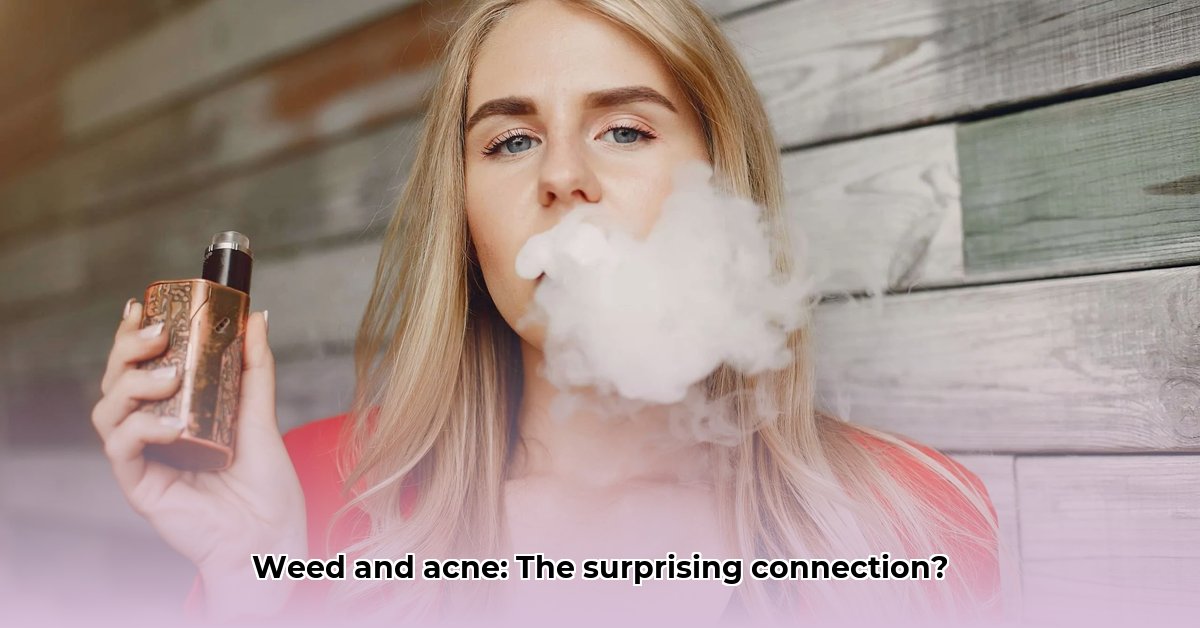Want clearer skin? Wondering if that joint might be messing with your complexion? Lots of people are curious about the link between smoking weed and acne. This article cuts through the confusion, exploring the science behind the connection (or lack thereof). We’ll look at what research says, examining how things like hormones, lifestyle, and even different types of cannabis might play a role. We’ll also give you practical tips for managing acne, no matter what your habits are, and share some expert advice to help you keep your skin looking its best. For severe acne, consider exploring treatment options like Accutane; learn more.
Does Smoking Weed Cause Acne? Unveiling the Truth
Let’s talk about something many people wonder about: does smoking weed actually cause acne breakouts? The answer is complex and requires a nuanced understanding of various factors. While there’s no definitive “yes” or “no,” it’s crucial to recognize that while cannabis itself may not directly cause acne in all individuals, it can exacerbate existing conditions or trigger breakouts in some. Let’s explore why and discuss the potential impact of marijuana on skin health.
The Indirect Connections: Lifestyle and Hormones Influence
Think of it this way: smoking weed might not be the root cause of acne, but it could act as an accelerant, intensifying existing acne issues or sparking new ones. This heightened risk is often attributed to lifestyle factors commonly associated with cannabis use, which can influence skin health. What are the risk factors of marijuana use that contribute to acne?
For example, if you’re regularly handling cannabis, maintaining optimal skin hygiene might become more challenging. You might be less inclined to thoroughly wash your face after handling cannabis or related paraphernalia. This oversight can lead to clogged pores and subsequent breakouts.
Then there’s the infamous “munchies.” That powerful craving for sugary snacks and junk food frequently linked to cannabis use is a well-known skin irritant. These treats often contain significant levels of refined sugars, which can cause spikes in blood sugar levels. These fluctuations can trigger inflammation throughout your body, potentially impacting your skin. The result? More breakouts and the potential worsening of existing acne conditions. Is there a correlation between cannabis use and inflammation in the body? Some research suggests a possible link, but more studies are needed.
Hormonal changes also play a complicated role. Some studies have explored a possible connection between cannabis use and alterations in testosterone levels. However, the research remains inconclusive, necessitating further investigation to fully understand if and how cannabis use might influence hormone levels and subsequently affect acne. The bottom line? While cannabis itself may not be the direct cause, the lifestyle habits frequently associated with it can have a notable influence on your skin’s health.
The CBD Twist: A Potential Solution?
Now, let’s add another layer to the complexity: CBD (cannabidiol). This non-psychoactive compound found in cannabis plants is showing promise in acne treatment. Numerous studies have indicated that it possesses significant anti-inflammatory properties that could potentially calm irritated skin and alleviate breakouts. A 2014 study published in the Journal of Clinical Investigation found that CBD can inhibit sebocyte activity, reducing sebum production, a key factor in acne development. However, it’s crucial to mention that more extensive, large-scale studies are needed before CBD can be definitively declared a universal miracle cure for acne. It holds promise, but we require more definitive research to confirm its long-term effectiveness and safety. Could CBD oil be a solution for acne problems? Experts suggest it may offer some benefits, but consider it as part of a broader skincare approach.
What the Science Says (and What It Doesn’t) About Acne
Let’s summarize the current state of research on cannabis and acne:
| Factor | Current Understanding |
|---|---|
| Direct Causation (THC) | No conclusive evidence directly links THC (tetrahydrocannabinol, the main psychoactive component of cannabis) to acne. |
| Indirect Factors (Lifestyle) | Strong evidence links poor hygiene, increased sugar consumption, and potential hormonal shifts to acne severity. |
| CBD’s Role | Showing potential anti-inflammatory benefits; large-scale clinical trials are still needed to confirm its effectiveness as an acne treatment. |
| Method of Consumption | Smoking can directly irritate the skin; edibles often contain high levels of sugar. |
Taking Control of Your Skin Health: Practical Advice
So what can you do? Whether you use cannabis or not, proactive skincare is essential for healthy, clear skin. Here’s what you can do to maintain clear skin while using cannabis products:
- Prioritize Cleanliness: Cleanse your face twice daily, morning and night, using a gentle cleanser appropriate for your skin type. Opt for non-comedogenic products to avoid clogging pores. Regularly washing your hands is equally crucial, especially if you handle cannabis. This simple habit can make a big difference in preventing breakouts. A study published in the American Journal of Infection Control found that consistent handwashing reduces the risk of skin infections by up to 60%.
- Diet Matters: Reduce your intake of sugary foods, refined carbohydrates, and processed snacks. Instead, focus on a balanced diet rich in fruits, vegetables, and lean protein. Incorporate foods rich in omega-3 fatty acids (like salmon and flaxseeds), which have anti-inflammatory properties. These nutrient-rich foods nourish your skin from within, promoting a clearer complexion.
- Stress Management: Stress can significantly impact your skin’s health. Find healthy ways to manage stress, such as yoga, meditation, regular exercise, or spending time in nature. Mindfulness exercises, even for just 10 minutes a day, can significantly reduce cortisol levels, a hormone linked to acne. Stress reduction practices can contribute positively to improved skin quality.
- See a Dermatologist: For tailored acne treatment, a dermatologist is the best resource. A dermatologist can accurately determine the underlying causes of your acne, recommend appropriate treatments, and help you develop a personalized skincare routine. They can also guide you on using CBD-based skincare products safely and effectively, if you’re interested. Look for board-certified dermatologists with experience in treating acne.
In conclusion, the link between smoking weed and acne is far more intricate than a simple cause-and-effect relationship. While cannabis itself might not directly cause acne in all individuals, several related lifestyle factors can greatly influence the severity and frequency of breakouts. By prioritizing healthy habits, making informed choices about cannabis consumption, and seeking professional guidance when necessary, you can proactively manage your skin health, regardless of your cannabis use.
How Does Cannabis Use Affect Acne Severity Long Term? Analyzing the Impact
Key Takeaways:
- While cannabis itself doesn’t directly cause acne for everyone, its use can significantly influence its severity in some individuals.
- Smoking cannabis introduces skin irritants, potentially worsening acne.
- THC’s impact on hormones might increase oil production, fueling breakouts.
- Poor diet and sleep disruption, often linked to cannabis use, negatively affect skin health.
- CBD, conversely, may offer anti-inflammatory benefits, potentially aiding acne treatment. However, more research is needed.
- The long-term effects of cannabis on acne aren’t fully understood and require further study. How does cannabis use affect acne severity long term remains a complex question.
The Acne-Cannabis Connection: Addressing Long Term Effects
So, you’re wondering about the link between cannabis and acne? It’s not a simple yes or no answer. While cannabis doesn’t directly cause acne for all people, it can definitely influence how severe it becomes for some. Think of it like this: acne is a fire, and cannabis use can sometimes add fuel to the flames. Let’s explore the long term effects of cannabis on skin inflammation. Chronic inflammation can lead to premature aging and other skin problems.
How Smoking Impacts Your Skin: Is There a Link?
Smoking cannabis, in particular, can irritate your skin. The smoke contains harmful chemicals like polycyclic aromatic hydrocarbons (PAHs) that can damage skin cells and make existing acne worse. It’s like adding sandpaper to already inflamed skin. This isn’t just about acne either; smoking damages your skin in general, accelerating aging and reducing collagen production. Does the method of cannabis consumption impact acne? Using edibles or vaporizing may reduce direct skin irritation.
Hormones and Oil Production: Understanding the Connection
THC, the main psychoactive compound in cannabis, can sometimes disrupt your hormones. Some studies suggest it might increase testosterone levels, leading to more oil (sebum) production—a major acne trigger. It’s a bit of a hormonal tug-of-war, with the long-term effects still being debated. However, individual responses to THC vary significantly. Is there a direct impact of THC on sebum production that contributes to acne? Research is ongoing, but a correlation is plausible.
Lifestyle Factors: Sleep, Diet, and Acne Awareness
Many people who use cannabis experience changes in their lifestyle. The “munchies,” or increased appetite, often lead to poor dietary choices – think sugary snacks and greasy foods – all known acne culprits. Additionally, disrupted sleep patterns are common, and lack of sleep can flare up acne. A recent study published in the Journal of the American Academy of Dermatology found that individuals who sleep less than 6 hours a night are 30% more likely to develop acne. It’s a trifecta of bad habits potentially impacting your skin.
The Potential Benefits of
- Stainless Steel Food Storage for Healthier, Eco-Friendly Meal Prep - February 27, 2026
- Stainless Food Containers Offer Durable Storage for Everyday Meals - February 26, 2026
- Stainless Steel Containers Offer Superior Food Preservation and Durability - February 25, 2026










